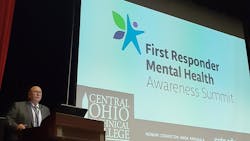OH Mental Health Summit Brings FFs, Police Together
NEWARK, OH—It was the car crash — the one in which the dad had been texting and crossed the centerline, killing his little girl — that finally pulled the string that started the unraveling of Jason Hufford's soul.
He took the heartache of that crash and piled it on top of images from so many other tragedies over the years: the fatal fires, the babies abused by parents, the crime scenes, the suicides, the bicyclists hit by cars. And it proved too much for the Newark firefighter.
"In 2017, my wheels came off my bus in a bad, bad way," he said as he stood alone on a stage in front of about 130 other law-enforcement officers, firefighters, paramedics and dispatchers from across Ohio who had gathered Wednesday for Central Ohio Technical College's inaugural First Responder Mental Health Awareness Summit.
Hufford's descent began with nightmares. That led to doses of Benadryl to force sleep. The medicine led to bourbon. And the bourbon led to hell.
"There were days I thought about taking a gun and going out back," the 47-year-old told the now silent crowd. "But I thought, 'Who's gonna raise my kids? And the guys who have to come find me? Now, they'll have to carry that trauma. What about my family?"
So Hufford sought counseling and various treatment programs. It saved his life.
He was at Wednesday's summit to give testimony and to advocate for seeking help, especially in a professional culture in which asking for assistance might be viewed as a little more difficult than in most.
"We've buried our head in the sand about the trauma and stress that first responders suffer for years," said Kevin Reardon, a retired Columbus firefighter and director of the college's Institute for Public Safety. "It used to be, if we were hurting, we'd get a kick in the butt from our lieutenant who said, 'Get over it. Move on.' "
The statistics tell the story:
Though specific numbers vary by source, curation from a host of studies shows that at least 115 firefighters and emergency medical service workers nationwide died by suicide in 2018 and at least 150 law-enforcement officers killed themselves. And experts believe that only about 40% are reported, meaning the actual number is far greater. For both classifications, those numbers exceed the numbers of personnel killed in the line of duty.
At least 10 New York City police officers have died by suicide this year, sparking a renewed national conversation about the stressors of the job.
And closer to home, the Columbus Division of Fire has had its own rough year, with at least two suicides within the division.
Those rates paint only part of the picture, said Kenneth Yeager, clinical program director of the Stress, Trauma and Resilience program at Ohio State University's Wexner Medical Center. He said a survey of firefighters and emergency medical services workers across Ohio last year showed that more than half suffered from depression, about 48% deal with "unexplained anger" and almost 20% have substance abuse issues.
Trauma for first responders often isn't from a single critical event, but instead accumulates over time, he said.
"It's the death by a thousand paper cuts," Yeager told conference attendees. "What do you do with all you've seen? What do you do with all that you bring home? Who takes care of you?"
The Columbus Division of Fire has found a new sense of purpose in answering those questions, said Lt. Dave Gerold, supervisor of the members support unit. The division this year created a new in-house program centered around self-care and resiliency. About 300 supervisors and officers took the training that wrapped up last week. Now, the focus will shift to battalion chiefs and then to the 1,500 or so members of the division.
The goal?
"To reduce the stigma ... and spread the message that you can only pick up rocks and put them in your backpack for so long," Gerold said.
Columbus police Cmdr. Rhonda Grizzell, who leads the division's new wellness bureau and attended the summit, is responsible for tending to the health — in all of its forms — of some 1,850 sworn officers and more than 250 civilian employees. She oversees the division's peer support group, with more than 100 officers professionally trained to help their colleagues in a safe and confidential way.
She said the conversation sparked by the rash of suicides in New York City has been a beneficial one to bring a total picture into the public's clear view.
"I want to use that momentum," she said. "People aren't calling the police because they're having a good day. They're calling us because they're in crisis. That takes a toll."
If you or someone you know needs help, reach Ohio's 24/7 Crisis Text Line by texting 4HOPE to 741741, or call the Franklin County Suicide Prevention Hotline at 614-221-5445; or the national Suicide Prevention Lifeline at 1-800-273-8255/TALK.
———
©2019 The Columbus Dispatch (Columbus, Ohio)
Visit The Columbus Dispatch (Columbus, Ohio) at www.dispatch.com
Distributed by Tribune Content Agency, LLC.
